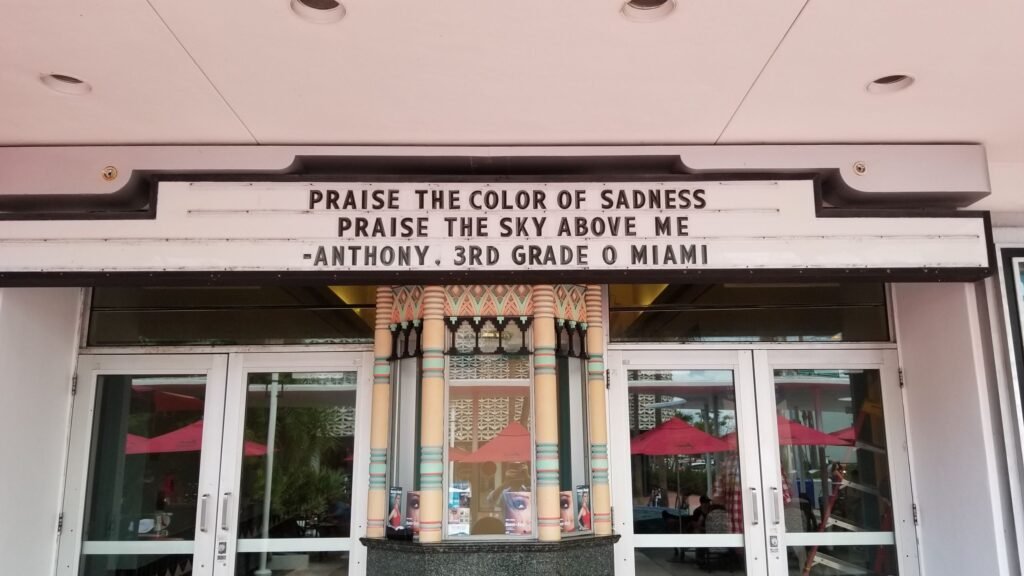Throughout April you might notice Miami seeming a tad more poetic. That is because on the fourth month of the calendar the Magic City gets taken over by O, Miami Poetry Festival. Starting on the first of April O, Miami Poetry Festival will bring rhythm and verse to our city with all kinds of activities and events. O, Miami founder P. Scott Cunningham hopped on to The Jitney to give us a feel for what we can expect from this year’s festival.
What originally inspired you to start O, Miami Poetry Festival?
P. Scott Cunningham: I went to grad school at FIU for fiction, but fell in love with poetry while studying with Denise Duhamel and Campbell McGrath. At the same time, I was also falling in love with Miami, which was still new to me, even though I grew up 45 minutes away in Boca. I started doing some grassroots organizing, and that led me to proposing the idea of a festival that celebrated Miami through the lens of poetry to the Knight Foundation. They said yes, and that started the journey.
What are some of the highlights you’re most excited about for this year’s festival?
This is a tough question because honestly, I discover the festival in the same way the audience does. Because our model is so heavily based in collaboration, I often don’t know the full extent of the programming until it’s happening. That may sound like a dereliction of duty, but it’s the only way to make a festival that feels larger than the sum of its parts. The most fun of the festival for me is working with other people and handing over creative control. That said, I’m very excited about the Opa-locka Light District. It’s a project we won a Public Space Challenge grant from Miami Foundation to do, and basically, it involves projecting the poems of Opa-locka residents onto sidewalks, buildings, and streets. I’m also excited about “Poetry in Bloom,” which will put poems, curated by SWWIM (Supporting Women Writers in Miami) inside floral arrangements.
Because of the pandemic and social distancing what changes did you have to make with this year’s edition?
Because the pandemic is still happening, we’ve largely cut in-person events out of the schedule, which is sad, because we love experiencing poetry in unlikely places around Miami. That kind of site-specificity is usually at the heart of what we do. To counter that, we’ve invested heavily in poetry-in-public-places. There will be a ton of places and times where you can interact with poems inside of the infrastructure of daily life in Miami. We also put an emphasis on online gatherings: ways we can create creative intimacy across the barriers of distance.
What about Miami makes it a positive (or negative) spot for poetry?
I believe Miami is the most poetic city in the United States. I believe that (1) because organizers in other cities always tell me they marvel at what happens here and (2) because we’ve been going around Miami for over a decade now attempting to bring poetry to Miamians and finding out, over and over, that they already have it. Miamians are naturally poetic. They have deep, personal connections to the art form. They are comfortable with absurdity. They’re expressive, compassionate, and imaginative. We’ve been asked on multiple occasions to bring O, Miami to other cities, and I’ve said no because I don’t know if other cities could pull off what Miamians do.
Who are some local poets that people should be reading and listening to?
There are so, so many, and I’ll name a few, but let me first point out that at the heart of the festival is the belief that poetry is a function of communities, not individuals. The words come through individuals but the poetry itself flows out of the community. Poets are like fruit. Their work dies if the vine it’s not connected to the tree, to the soil, to the water, and to the sun. We should never make the mistake of believing that the fruit appears whole cloth from thin air. That said, I love Legna Rodríguez Iglesias, and I think she’s one of the most dynamic young poets in the whole country. Arsimmer McCoy is writing my favorite poems about Miami places. Caridad Moro-Gronlier just came out with a new book, Tortillera, I’m very excited about. And then there are also “Miami” poets who aren’t living here right now, like Gabriel Ojeda-Ságue, Leslie Sainz, Connie Mae Oliver, and Stefanie Fernández. I’d also recommend a Miami novel that reads like poetry, Fiebre Tropical by Juli Delgado Lopera.
What is your advice to aspiring poets?
I apologize if this is too specific. First, don’t worry about writing poems. Instead, organize your reading life. First create a folder on your computer for other poets. Mine is called, “OPP” for “Other People’s Poetry.” Create a file for each poet and type out the poems you put in there, don’t just copy and paste. Yes, this takes longer, but if you’re not taking your time with this, do you really care about it? Then, once you’ve got a bunch of poet folders, create a “book” of poems you love by other poets in one document. Make a title, a table of contents, everything you’d do for your own manuscript, but it’s completely composed of other people’s poems. Try to make it the length of a real collection and don’t be afraid to revise it or re-do it. If you’re tending to this “garden” on a regular basis, you’ll end up writing plenty of poems. However, in the event that you still feel like you’re not writing enough, just pick a poem out of your OPP book and write an imitation of it.

